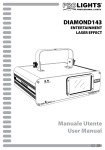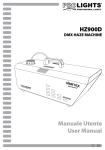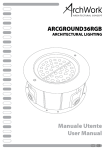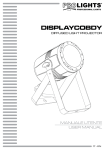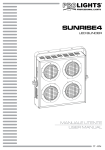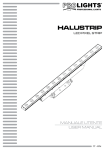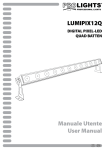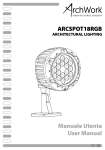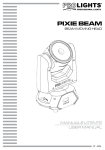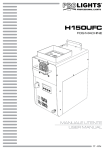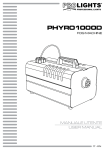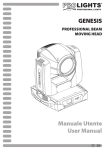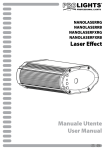Download Manuale Utente User Manual DIAMOND152
Transcript
DIAMOND152 ENTERTAINMENT LASER EFFECT Manuale Utente User Manual I GB REV.002-10/10 DIAMOND152 3 INTRODUZIONE Vi ringraziamo per aver scelto un prodotto PROLIGHTS. DIAMOND152 è un proiettore laser realizzato con qualità costruttiva e soluzioni tecniche in grado di unire performance di spessore e ampia flessibilità nel controllo. INDICE Sicurezza Avvertenze generali Attenzioni e precauzioni per l’installazione Sicurezza laser e istruzioni operative Informazioni generali 4 4 5 6 1 Descrizione e specifiche tecniche 1. 1 Elementi di comando e collegamenti 1. 2 Descrizione 1. 3 Specifiche tecniche 7 9 9 2 Installazione 2. 1 Montaggio 10 3 Funzioni e impostazioni 3. 1 Funzionamento 3. 2 Impostazione base 3. 3 Struttura del menu 3. 4 Funzionamento in modalità Stand Alone 3. 5 Modalità Slave 3. 6 Collegamento 3. 7 Modalità DMX 3. 8 Indirizzamento DMX 3. 9 Collegamenti della linea DMX 3. 10 Costruzione del terminatore DMX 3. 11 Tabella canali DMX 11 11 12 12 13 14 14 14 15 15 16 4 Manutenzione 4. 1 Pulizia sistema ottico e manutenzione 19 Certificato di garanzia CONTENUTO DELL’IMBALLO: • DIAMOND152 • Cavo di alimentazione con spina • Chiave (per safety switch) (2 p.zi) • Connettore 2 poli per remote interlock • Staffa di fissaggio • Manuale utente Music & Lights S.r.l. si riserva ogni diritto di elaborazione in qualsiasi forma delle presenti istruzioni per l’uso. La riproduzione - anche parziale - per propri scopi commerciali è vietata. Tutte le specifiche possono essere variate senza alcuna notifica. DIAMOND152 4 ATTENZIONE! Prima di effettuare qualsiasi operazione con l’unità, leggere con attenzione questo manuale e conservarlo accuratamente per riferimenti futuri. Contiene informazioni importanti riguardo l’installazione, l’uso e la manutenzione dell’unità. SICUREZZA Avvertenze generali • I prodotti a cui questo manuale si riferisce sono conformi alle Direttive della Comunità Europea e pertanto recano la sigla . • Il dispositivo funziona con pericolosa tensione di rete 230V~. Non intervenire mai al suo interno al di fuori delle operazioni descritte nel presente manuale; esiste il pericolo di una scarica elettrica. • È obbligatorio effettuare il collegamento ad un impianto di alimentazione dotato di un’efficiente messa a terra (apparecchio di Classe I secondo norma EN 60598-1). Si raccomanda, inoltre, di proteggere le linee di alimentazione delle unità dai contatti indiretti e/o cortocircuiti verso massa tramite l’uso di interruttori differenziali opportunamente dimensionati. • Le operazioni di collegamento alla rete di distribuzione dell’energia elettrica devono essere effettuate da un installatore elettrico qualificato. Verificare che frequenza e tensione della rete corrispondono alla frequenza ed alla tensione per cui l’unità è predisposta, indicate sulla targhetta dei dati elettrici. • L’unità non per uso domestico solo per uso professionale. • Il dispositivo è previsto solo per l’uso interno; evitare l’impiego in: - luoghi soggetti ad elevata umidità dell’aria; - luoghi a temperatura superiore ai 40°C o inferiori a 10°C. • Evitare che nell’unità penetrino liquidi infiammabili, acqua o oggetti metallici. • Non smontare e non apportare modifiche all’unità. • Tutti gli interventi devono essere sempre e solo effettuati da personale tecnico qualificato. Rivolgersi al più vicino centro di assistenza tecnica autorizzato. • Se si desidera eliminare il dispositivo definitivamente, consegnarlo per lo smaltimento ad un’istituzione locale per il riciclaggio. Attenzioni e precauzioni per l’installazione • Se il dispositivo dovesse trovarsi ad operare in condizioni differenti da quelle descritte nel presente manuale, potrebbero verificarsi dai danni; in tal caso la garanzia verrebbe a decadere. Inoltre, ogni altra operazione potrebbe provocare cortocircuiti, incendi, scosse elettriche, rotture etc. • Prima di iniziare qualsiasi operazione di manutenzione o pulizia sull’unità togliere la tensione dalla rete di alimentazione. • Ogni persona coinvolta con l’installazione e la manutenzione di questo dispositivo deve essere qualificata e seguire le istruzioni di questo manuale. • Nell’eseguire qualsiasi intervento attenersi scrupolosamente a tutte le normative (in materia di sicurezza) vigenti nel paese di utilizzo. • È assolutamente necessario fissare l’unità per mezzo di una fune di sicurezza. • La distanza minima tra il proiettore e le pareti circostanti deve essere superiore a 50cm e non devono essere ostruite, in nessun caso, le aperture d’aerazione. • Mantenere materiali infiammabili ad una distanza di sicurezza dall’unità. • Assicurarsi che l’interruttore POWER è impostato su posizione di OFF prima di collegare il dispositivo alla rete elettrica. • Non accendere il dispositivo e spegnerlo dopo brevi intervalli in quanto ciò ridurrebbe la vita del diodo laser. • Non guardare direttamente il fascio luminoso. Tenere presente che i veloci cambi di luce possono provocare attacchi d’epilessia presso persone fotosensibili o epilettiche. DIAMOND152 5 Sicurezza laser e istruzioni operative • Non utilizzare il proiettore laser senza lettura e comprensione sulla sicurezza laser e sulle istruzioni operative contenute in questo manuale. • Il raggio laser può causare danni permanenti agli occhi ed alla pelle. • Non dirigere il raggio laser su persone o animali. • Non dirigere il raggio laser su superfici altamente riflettenti come finestre, specchi e metalli lucidi. Anche la riflessione del laser può essere pericolosa. • Non guardare mai l’apertura laser o i raggi laser. • Non sottoporre l’uscita ottica (apertura), ai prodotti chimici di pulizia. • Non utilizzare il proiettore laser se il corpo di alloggiamento è danneggiato o aperto, o se l’ottica appare in qualche modo danneggiata. • Non aprire mai l’alloggiamento del laser. I livelli di potenza del laser possono provocare lesioni alla pelle e agli occhi. • In alcuni Stati occorre sottostare a regole specifiche per l’impiego di apparecchiature laser. Si prega di chiedere informazioni specifiche, presso le autorità competenti, prima di adoperare il laser. • Secondo le norme internazionali di sicurezza, il proiettore laser deve essere installato in modo che il raggio laser presenta una distanza minima di 3 m dal pavimento se, sotto il raggio, si trattengono delle persone. Tuttavia, il dispositivo può essere installato anche in modo che il raggio laser, in senso orizzontale, sia ad una distanza minima di 2,5 m dalle persone. Il presente laser, DIAMOND152, è attribuito alla classe 3B e presenta le seguenti caratteristiche: POTENZA MAX DEL LASER = 50mW LUNGHEZZA D’ONDA DEL LASER = 532nm (verde) POTENZA MAX DEL LASER = 100mW LUNGHEZZA D’ONDA DEL LASER = 650nm (rosso) IMPORTANTE! L’unità deve essere installata in modo tale da escludere che si possa guardare direttamente nel raggio laser. Anche una breve esposizione può provocare dei danni permanenti agli organi visivi. Si devono evitare riflessi involontari. Il funzionamento di un laser di classe 3B è consentito solo se controllato da un operatore qualificato. Per impedire l’utilizzo non autorizzato servirsi dell’interruttore a chiave. DIAMOND152 6 I dispositivi laser con radiazioni accessibili recano etichette in modo da indicare: -- il segnale d’avvertimento laser; -- la classe di appartenenza del dispositivo laser unitamente all’indicazione cautelativa e di avvertimento pertinente, nonché -- i dati di identificazione e i dati del tipo. LASER EMISSION DATA Laser Classification Class 3B Green Laser Medium DPSS Nd:YVO4, 532nm Red Laser Medium LD GaAlAs 650nm, typical Beam Diameter <5mm at aperture Pulse Data All pulses < 4Hz (>0.25sec) Divergence (each beam) <2 mrad Divergence (total light) <160 degrees Laser Power Red<100mW, Green<50mW LASER RADIATION AVOID EXPOSURE TO THE BEAM CLASS 3B LASER PRODUCT LASER APERTURE LASER RADIATION INFORMAZIONI GENERALI Spedizioni e reclami Le merci sono vendute “franco nostra sede” e viaggiano sempre a rischio e pericolo del distributore/cliente. Eventuali avarie e danni dovranno essere contestati al vettore. Ogni reclamo per imballi manomessi dovrà essere inoltrato entro 8 giorni dal ricevimento della merce. Garanzie e resi Il prodotto è coperto da garanzia in base alle vigenti normative. Sul sito www.musiclights.it è possibile consultare il testo integrale delle “Condizioni Generali di Garanzia”. Si prega, dopo l’acquisto, di procedere alla registrazione del prodotto sul sito www.musiclights.it. In alternativa il prodotto può essere registrato compilando e inviando il modulo riportato alla fine del manuale. A tutti gli effetti la validità della garanzia è avallata unicamente dalla presentazione del certificato di garanzia. Music & Lights constata tramite verifica sui resi la difettosità dichiarata, correlata all’appropriato utilizzo, e l’effettiva validità della garanzia; provvede quindi alla riparazione dei prodotti, declinando tuttavia ogni obbligo di risarcimento per danni diretti o indiretti eventualmente derivanti dalla difettosità. Le informazioni riportate in questo manuale sono state attentamente controllate. Music & Lights S.r.l. non si assume, tuttavia, responsabilità derivanti da eventuali inesattezze. DIAMOND152 7 - 1 - DESCRIZIONE E SPECIFICHE TECNICHE 1.1 Elementi di comando e collegamenti 2 1 43 Power Music LASER APERTURE 152 5 VISTA FRONTALE 1. Staffa di montaggio. 2. Manopola di fissaggio per la staffa di montaggio. 3. INDICATORE DEL SEGNALE MUSICALE: il LED blu si accende se il microfono (15) rileva un segnale musicale di volume sufficiente per comandare il raggio laser. 4. Indicatore di funzionamento: quando il LED rosso è acceso, il dispositivo è in funzione. 5. APERTURA RAGGIO LASER. Fig.1 DIAMOND152 8 9 7 6 8 10 11 PANNELLO POSTERIORE 6. PRESA DI VENTILAZIONE: apertura per uscita flusso d’aria da non ostruire. 7. SAFETY EYE per l’aggancio al cavo di sicurezza. 8. Led display. 9. PANNELLO DI CONTROLLO con 4 pulsanti per accesso e gestione delle diverse funzioni; 10. DMX OUT (XLR a 3 poli): 1= massa, 2 = DMX -, 3 = DMX +; 11. DMX IN (XLR a 3 poli): 1 = massa, 2 = DMX -, 3 = DMX +; 12. POWER IN spina da pannello VDE per il collegamento ad una presa di rete (100-240V~/50-60Hz) tramite il cavo rete in dotazione. Accanto la spina si trova il portafusibile. Sostituire un fusibile difettoso solo con uno dello stesso tipo; 18 17 12 16 15 13 14 Fig.2 13. INTERRUTTORE ON/OFF; 14. GND POINT usato per la messa a terra del dispositivo; 15. MICROFONO per il comando tramite la musica; 16. REGOLATORE SENSITIVITY per la sensibilità in caso di comando tramite la musica per mezzo del microfono integrato; 17. SAFETY SWITCH per attivare/disattivare il raggio laser (diodo laser). Per ragioni di sicurezza assicurarsi che la chiave sia utilizzata solo dall’operatore autorizzato; 18. REMOTE INTERLOCK per la connessione con il sistema di blocco d’emergenza (opzionale); DIAMOND152 9 1.2 Descrizione Prestazioni ed evoluzione tecnologica sono tra le prerogative nella progettazione e nello sviluppo delle novità Prolights. La serie Diamond di proiettori laser è la più recente evoluzione del segmento destinato al settore dell’intrattenimento multimediale. Sviluppati per rispondere sia alle necessità dei professionisti più esigenti che degli appassionati del settore, i nuovi laser Diamond sono realizzati con qualità costruttiva e soluzioni tecniche in grado di unire performance di spessore a ampia flessibilità nel controllo. La serie comprende sia compatti proiettori mono-cromatici che professionali unità grafiche a 7 colori, ottenuti mediante miscelazione RGB. Diversi per potenza e contenuti tecnologici, ciascuno dei laser Diamond consente la realizzazione di lasershow d’impatto, dalla riproduzione di vettori e grafiche animate alla generazione di fondali scenografici, fino alla creazione di impressionanti sequenze e animazioni interamente in 3D. I proiettori laser Diamond offrono numerose possibilità di funzionamento: protocollo DMX, attivazione musicale, Master/Slave, esecuzione automatica di articolati show pre-programmati e protocollo ILDA per il controllo completo delle funzioni tramite i software compatibili ILDA. I proiettori Diamond sono equipaggiati con i dispositivi previsti dalle normative di sicurezza, ciascuna unità è dotata di interruttore di sicurezza con chiave. 1.3 Specifiche tecniche • Sorgente luminosa: diodo laser 50mW 532nm verde + 100mW 650nm rosso. • Emissione di radiazioni: Classe 3B. • Frequenza di scansione: 5kHz. • Modalità di controlllo: protocollo DMX512 con 10 canali di funzionamento, Master/Slave, automaticomusicale con microfono incorporato, automatico con show preprogrammati. • Software interno: gestione dal display LED a tre caratteri. • Connessioni: ingresso/uscita XLR 3p. • Sicurezza: conforme alle normative EN60825-1:1994, sistema di bloccaggio manuale con chiave e ingresso per pulsante di spegnimento di emergenza. • Alimentazione: AC 230V, 50-60Hz. • Consumo: 28W. • Dimensioni (LxAxP): 240x110x250 mm. • Peso: 2,6 kg. 10 DIAMOND152 - 2 - INSTALLAZIONE 2.1 Montaggio Il DIAMOND152 può essere collocato su un piano solido. Inoltre, grazie alle possibilità di fissaggio sulla staffa (fig.3), l’unità può essere montata con versatilità su una traversa. Per il fissaggio occorrono dei supporti robusti per il montaggio. L’area di collocazione deve avere una stabilità sufficiente e supportare almeno 10 volte il peso dell’unità. Inoltre, assicurarsi di rispettare tutte le avvertenze, in materia di sicurezza, per i dispositivi a raggio laser. • Fissare il proiettore attraverso l’apposita staffa (1) ad una collocazione idonea. • È assolutamente necessario assicurare il proiettore contro la caduta utilizzando un cavo di sicurezza: in particolare collegare il cavo in un punto adatto in modo che la caduta del proiettore non possa superare i 20 cm. • Orientare il proiettore intervenendo, se necessario, sulla manopola della staffa di montaggio (2). 1 2 Fig.3 DIAMOND152 11 - 3 - FUNZIONI E IMPOSTAZIONI 3.1 Funzionamento Inserire la spina del cavo di alimentazione in una presa di rete (230V~ 50Hz). Accendere il DIAMOND152, con l’interruttore (13). Si accende il LED rosso (4) di funzionamento. Per azionare il raggio laser, inserire la chiave in dotazione nella serratura relativa (17) e girare la chiave in posizione ON. Quando il laser è acceso, il display LED (8) sul pannello posteriore mostra la modalità di funzionamento corrente. L’unità può essere comandata da un’unità DMX di comando luce oppure svolgere autonomamente il suo programma. ATTENZIONE. Il raggio laser viene emesso entro 5 secondi dall’accensione dell’unità. Inoltre, il funzionamento di un laser di classe 3B è consentito solo se controllato da un operatore qualificato. • Il proiettore laser non è progettato per un utilizzo continuato. Al fine di ottimizzare la vita del dispositivo effettuare regolari pause durante il funzionamento. • Non accendere e spegnere l’unità in brevi intervalli di tempo. • Disconnettere l’unità quando non è utilizzata per lunghi periodi di tempo. • In caso di gravi problemi di funzionamento, smettere di usare il dispositivo e contattare immediatamente un centro di assistenza tecnica autorizzato. 3.2 Impostazione base Il laser DIAMOND152 dispone di un LED display e 4 pulsanti per l’accesso alle funzioni del pannello di controllo (fig.4). Fig.4 [FUNC] Per scegliere la modalità di funzionamento del laser. [ENTER] Per confermare o modificare tutte le impostazioni del pannello di controllo. [UP] Per cambiare la modalità di funzionamento, le impostazioni o l’indirizzo DMX. [DOWN] DIAMOND152 12 3.3 Struttura del menu UP DOWN AUN ENTER Sod Aud Sop AUP FUNC SoN UP DOWN 000 ENTER 512 SLA ENTER 3.4 Funzionamento in modalità Stand Alone In questa modalità l’unità è impostata come Master. Per entrare nella modalità Stand Alone bisogna procedere come segue: • Premere il tasto FUNC fino a quando sul display non appare la scritta lampeggiante [AUN ] (fig.5). • Selezionare, attraverso i pulsanti UP e DOWN, la funzione desiderata tra quelle nella tabella riportata di seguito. • Per confermare premere il tasto ENTER. Fig.5 DIAMOND152 13 Display Function AUN Auto running mixed show, Pattern effect + Grating effect Sod Sound activated grating effect show Aud Auto running grating effect show Sop Sound activated pattern effect show AUP Auto running pattern effect show SoN Sound activated mixed show, Pattern effect + Grating effect Nelle modalità contrassegnate dalla descrizione “Sound activated” si può comandare il DIAMOND152 esclusivamente tramite il microfono integrato. Impostare il regolatore SENSITIVITY (16) per la sensibilità del microfono in modo tale che il ritmo della musica venga riprodotto in modo ottimale dai movimenti del raggio laser. La maggiore sensibilità si ha con il regolatore girato completamente a destra. Quando viene rilevato un segnale musicale il LED blu (3) si accende. NOTA: Se si modifica il volume dell’impianto musicale occorre adattare anche la sensibilità del microfono con l’aiuto del relativo regolatore. 3.5 Modalità Slave Questa modalità consente di collegare in linea più unità DIAMOND152 senza un controller. La prima unità sarà impostata come master e le altre funzioneranno come slave con lo stesso effetto. • Premere il tasto FUNC fino a quando sul display non appare [SLA ] (fig.6). • Servirsi dei connettori DMX del DIAMOND152 e di un cavo XLR per formare una catena di unità. In certe condizioni e lunghezze si consiglia di effettuare una terminazione come mostrato a pagina 15. Fig.6 DIAMOND152 14 3.6 Collegamento Si possono collegare più unità affinché tutte le unità secondarie abbiano lo stesso effetto luce dell’unità principale (Master). 1. Collegare l’uscita DMX OUT dell’unità principale con l’ingresso DMX IN della prima unità secondaria servendosi di un cavo XLR a 3 poli. 2. Collegare l’uscita DMX OUT della prima unità secondaria con l’ingresso DMX IN della seconda unità secondaria ecc. 3.7 Modalità DMX • Per poter entrare nella modalità DMX, premere il tasto FUNC fino a quando sul display non appare l’indirizzo DMX (fig.7). • Premere il tasto UP e DOWN per selezionare il valore desiderato (001 fino a 512); tenere premuto invece il tasto UP e DOWN per lo scorrimento veloce. • Al termine dell’impostazione premere il tasto ENTER per confermare. Fig.7 3.8 Indirizzamento DMX Per poter comandare il DIAMOND152 con un’unità di comando luce, occorre impostare l’indirizzo di start DMX per il primo canale DMX. Se, per esempio, sull’unità di comando è previsto l’indirizzo 33 per comandare la funzione del primo canale DMX, si deve impostare sul DIAMOND152 l’indirizzo di start 33. Le altre funzioni del pannello saranno assegnate automaticamente agli indirizzi successivi. Segue un esempio con indirizzo 33 di start: Numero canali DMX Indirizzo di start (esempio) Indirizzo DMX occupati Prossimo indirizzo di start possibile per unità n°1 Prossimo indirizzo di start possibile per unità n°2 Prossimo indirizzo di start possibile per unità n°3 10 33 33-42 43 53 63 DIAMOND152 15 3.9 Collegamenti della linea DMX La connessione DMX è realizzata con connettori standard XLR. Utilizzare cavi schermati, 2 poli ritorti, con impedenza 120Ω e bassa capacità. Per il collegamento fare riferimento allo schema di connessione riportato di seguito: DMX - INPUT Spina XLR 1 DMX - OUTPUT Presa XLR Pin1 : Massa - Schermo Pin2 : - Negativo Pin3 : + Positivo 2 3 2 1 3 ATTENZIONE La parte schermata del cavo (calza) non deve mai essere collegata alla terra dell’impianto; ciò comporterebbe malfunzionamenti delle unità e dei controller. Per passaggi lunghi può essere necessario l’inserimento di un amplificatore DMX. In tal caso, è sconsigliato utilizzare nei collegamenti cavo bilanciato microfonico poiché non è in grado di trasmettere in modo affidabile i dati di controllo DMX. • Collegare l’uscita DMX del controller con l’ingresso DMX della prima unità; • Collegare, quindi, l’uscita DMX con l’ingresso DMX della successiva unità; l’uscita di quest’ultima con l’ingresso di quella successiva e via dicendo finchè tutte le unità sono collegate formando una catena. • Per installazioni in cui il cavo di segnale deve percorrere lunghe distanze è consigliato inserire sull’ultima unità una terminazione DMX. 3.10 Costruzione del terminatore DMX La terminazione evita la probabilità che il segnale DMX 512, una volta raggiunta la fine della linea stessa venga riflesso indietro lungo il cavo, provocando, in certe condizioni e lunghezze, la sua sovrapposizione al segnale originale e la sua cancellazione. La terminazione deve essere effettuata, sull’ultima unità della catena, con connettori XLR a 5 pin o 3 pin, saldando una resistenza di 120Ω (minimo 1/4W) tra i terminali 2 e 3, così come indicato in figura. 1 2 3 2 3 1 120 Ω Esempio: connettore XLR a 3 pin DIAMOND152 16 3.11 Tabella canali DMX Channel 1 Operating mode Function in the 10 channel mode DMX value Laser turned off Auto mixed show Sound activated mixed show Auto pattern effect show Sound activated pattern effect show Auto grating effect show Sound activated grating effect show 000-024 025-049 050-074 075-099 100-124 125-149 150-174 DMX mode with grating dots effect DMX mode with grating pattern effect DMX mode with traditional pattern effect 175-199 200-224 225-255 Grating Dots Effect mode, when channel 1 is 175-199 Channel Function DMX value 2 Movement in the X axis Static displacement: 128 positions Permanent movement, start to the left, slow to fast Permanent movement, start to the right, slow to fast 000-127 128-191 192-255 3 Movement in the Y axis Static displacement: 128 positions Permanent movement, start upwards, slow to fast Permanent movement, start downwards, slow to fast 000-127 128-191 192-255 4 Color Laser turned off RG on, or R&G strobing Red on, or Red strobe & Green off Green on, or Green strobe & red off RG on, or R & G alternately strobing 000-009 010-063 064-127 128-191 192-255 5 Strobe No strobing Strobing speed Strobing to sound 000-009 010-249 250-255 6 Grating Rotation Clockwise rotating Stop Anticlockwise rotating 000-075 076-150 151-255 DIAMOND152 17 Grating Patterns Effect mode, when channel 1 is 200-224 Channel Function DMX value 2 Standard patterns 11 grating patterns 000-255 3 Zooming 100%-5% size Zooming In Zooming Out Zooming In & Out 000-127 128-169 170-209 210-255 4 Rotation around the Y axis 0-359 degree fixed Y axis rolled Permanent clockwise rotation, slow to fast Permanent counter-clockwise rotation, slow to fast 000-127 128-191 192-255 5 Rotation around the X axis 0-359 degree fixed X axis rolled Permanent clockwise rotation, slow to fast Permanent counter-clockwise rotation, slow to fast 000-127 128-191 192-255 6 Rotation around the Z axis 0-359 degree fixed Z axis rolled Permanent clockwise rotation, slow to fast Permanent counter-clockwise rotation, slow to fast 000-127 128-191 192-255 7 Movement in the X axis Static displacement: 128 positions Permanent movement, start to the left, slow to fast Permanent movement, start to the right, slow to fast 000-127 128-191 192-255 8 Movement in the Y axis Static displacement: 128 positions Permanent movement, start upwards, slow to fast Permanent movement, start downwards, slow to fast 000-127 128-191 192-255 9 Color Red Green Red & Green ( Yellow) Color rolling 000-016 017-031 032-049 050-255 10 Grating rotation Clockwise grating rotating No grating rotating Anticlockwise grating rotating 001-075 076-150 151-255 DIAMOND152 18 Patterns Beam Effect mode, when channel 1 is 225-255 Channel Function DMX value 2 Standard patterns 11 grating patterns 000-255 3 Zooming 100%-5% size Zooming In Zooming Out Zooming In & Out 000-127 128-169 170-209 210-255 4 Rotation around the Y axis 0-359 degree fixed Y axis rolled Permanent clockwise rotation, slow to fast Permanent counter-clockwise rotation, slow to fast 000-127 128-191 192-255 5 Rotation around the X axis 0-359 degree fixed X axis rolled Permanent clockwise rotation, slow to fast Permanent counter-clockwise rotation, slow to fast 000-127 128-191 192-255 6 Rotation around the Z axis 0-359 degree fixed ZY axis rolled Permanent clockwise rotation, slow to fast Permanent counter-clockwise rotation, slow to fast 000-127 128-191 192-255 7 Movement in the X axis Static displacement: 128 positions Permanent movement, start to the left, slow to fast Permanent movement, start to the right, slow to fast 000-127 128-191 192-255 8 Movement in the Y axis Static displacement: 128 positions Permanent movement, start upwards, slow to fast Permanent movement, start downwards, slow to fast 000-127 128-191 192-255 9 Color Original Color Red Green Yellow Single color alternating speed Mix color alternating speed 000-016 017-031 032-047 048-062 063-160 161-255 DIAMOND152 19 - 4 - MANUTENZIONE 4.1 Pulizia sistema ottico e manutenzione • Durante gli interventi, assicurarsi che l’area sotto il luogo di installazione sia libera da personale non qualificato. • Spegnere l’unità, scollegare il cavo di alimentazione ed aspettare finché l’unità non si sia raffreddata. • Tutte le viti utilizzate per l’installazione dell’unità e le sue parti devono essere assicurate saldamente e non devono essere corrose. • Alloggiamenti, elementi di fissaggio e di installazione (soffitto, truss, sospensioni) devono essere totalmente esenti da qualsiasi deformazione. • I cavi di alimentazione devono essere in condizione impeccabile e devono essere sostituiti immediatamente nel momento in cui anche un piccolo problema viene rilevato. • L’interno del dispositivo deve essere pulito ogni anno utilizzando un aspirapolvere o un getto d’aria. • Si dovrebbe procedere, ad intervalli regolari, alla pulizia della parte frontale per asportare polvere, fumo e altre particelle. Solo così la luce può essere irradiata con la luminosità massima. Per la pulizia usare un panno morbido pulito e un detergente per vetri come si trovano in commercio. Quindi asciugare le parti delicatamente. Attenzione: consigliamo che la pulizia interna sia eseguita da personale qualificato! DIAMOND152 1 INTRODUCTION Thank you for purchasing a PROLIGHTS product. DIAMOND152 combines build quality and technical solutions allowing outstanding performances and full flexibility of control. INDEX Safety General instructions Warnings and installation precautions Laser safety and operating instructions General information 2 2 3 4 1 Description and technical specifications 1. 1 Operating elements and connections 1. 2 Description 1. 3 Technical specifications 5 7 7 2 Installation 2. 1 Mounting 8 3 Functions and settings 3. 1 Operation 3. 2 Basic 3. 3 Menu structure 3. 4 Operation in Stand Alone mode 3. 5 Slave Mode 3. 6 Linking 3. 7 DMX Mode 3. 8 DMX addressing 3. 9 Connection of the DMX line 3. 10 Construction of the DMX termination 3. 11 DMX control 9 9 10 10 11 12 12 12 13 13 14 4 Maintenance 4. 1 Cleaning the unit and maintenance 17 Warranty PACKING CONTENT: • DIAMOND152 • Power cable with plug • Keys (for safety switch) (2 pcs) • Remote interlock • Mounting bracket • User manual All rights reserved by Music & Lights S.r.l. No part of this instruction manual may be. Reproduced in any form or by any means for any commercial use. Design and specifications are subject to change without notice. DIAMOND152 2 WARNING! Before carrying out any operations with the unit, carefully read this instruction manual and keep it with cure for future reference. It contains important information about the installation, usage and maintenance of the unit. SAFETY General instructions • The products referred to in this manual conform to the European Community Directives and are therefore marked with . • The unit is supplied with hazardous network voltage (230V~). Leave servicing to skilled personnel only. Never make any modifications on the unit not described in this instruction manual, otherwise you will risk an electric shock. • Connection must be made to a power supply system fitted with efficient earthing (Class I appliance according to standard EN 60598-1). It is, moreover, recommended to protect the supply lines of the units from indirect contact and/or shorting to earth by using appropriately sized residual current devices. • The connection to the main network of electric distribution must be carried out by a qualified electrical installer. Check that the main frequency and voltage correspond to those for which the unit is designed as given on the electrical data label. • This unit is not for home use, only professional applications. • The projector is for indoor use only; never use the fixture under the following conditions: - in places subject to excessive humidity; - in places with a temperature of over 40°C or less than 10°C. • Make certain that no inflammable liquids, water or metal objects enter the fixture. • Do not dismantle or modify the fixture. • All work must always be carried out by qualified technical personnel. Contact the nearest sales point for an inspection or contact the manufacturer directly. • If the unit is to be put out of operation definitively, take it to a local recycling plant for a disposal which is not harmful to the environment. Warnings and installation precautions • If this device will be operated in any way different to the one described in this manual, it may suffer damages and the guarantee becomes void. Furthermore, any other operation may lead to dangers like short circuit, burns, electric shock, ect. • Before starting any maintenance work or cleaning the projector, cut off power from the main supply. • Every person involved with installation and maintenance of this device have to be qualified and follow the instructions of this manual • Always additionally secure the projector with the safety rope. When carrying out any work, always comply scrupulously with all the regulations (particularly regarding safety) currently in force in the country in which the fixture’s being used. • The minimum distance between the fixture and surrounding walls must be more than 50cm and the air vents at the housing must not be covered in any case. • Keep any inflammable material at a safe distance from the fixture. • Make sure that the power-switch is set to off-position before you connect the device to the mains. • Do not switch the fixture on and off in short intervals as this would reduce the laser diode life. • Never look directly at the light beam. Please note that fast changes in lighting, e. g. flashing light, may trigger epileptic seizures in photosensitive persons or persons with epilepsy. DIAMOND152 3 Laser safety and operating instructions • Do not operate laser without first reading and understanding all safety and technical data in this manual. • This laser product can potentially cause instant eye injury or blindness if laser light directly strikes the eyes. • Do not point lasers at people or animals. • Do not point lasers at highly reflective surfaces such as windows, mirrors and shiny metal. Even laser reflections can be hazardous. • Never look into the laser aperture or laser beams. • Do not expose the output optic (aperture) to cleaning chemicals. • Do not use laser if housing is damaged or open, or if optics appear damaged in any way. • Never open the laser housing. The high laser power levels inside of the protective housing can start fires, burn skin and will cause instant eye injury. • As the safety regulations are different in each country, the regulations of the country where the unit will be operated must be observed in any case. • According to international safety regulations the laser must be installed so that the laser beam has a minimum distance of 3 m to the floor when persons stand or sit under the beam. However, the unit can also be installed so that in the horizontal plane the laser beam keeps a minimum distance of 2.5 m to persons. This laser corresponds to the class 3B and has the following power and wavelength: MAX. LASER POWER = 50mW LASER WAVELENGTH = 532nm (green) MAX. LASER POWER = 100mW LASER WAVELENGTH = 650nm (red) IMPORTANT! The unit must be installed so that nobody will be able to look directly into the laser beam. Already a short radiation on the retina may cause permanent damage. Unintentional reflections must be prevented. The laser system must not be operated without the presence of a laser protection adviser. In case of absence, this advisor should have secured the laser beam with the key switch against unauthorized operation. DIAMOND152 4 LASER SAFETY LABEL REPRODUCTIONS -- Class 3B laser radiation, when open, avoid exposure to beam. -- Laser radiation avoid exposure to beam class 3B laser product. -- The label indicates the laser beam output aperture. LASER EMISSION DATA Laser Classification Class 3B Green Laser Medium DPSS Nd:YVO4, 532nm Red Laser Medium LD GaAlAs 650nm, typical Beam Diameter <5mm at aperture Pulse Data All pulses < 4Hz (>0.25sec) Divergence (each beam) <2 mrad Divergence (total light) <160 degrees Laser Power Red<100mW, Green<50mW LASER RADIATION AVOID EXPOSURE TO THE BEAM CLASS 3B LASER PRODUCT LASER APERTURE LASER RADIATION GENERAL INFORMATION Shipments and claims The goods are sold “ex works” and always travel at the risk and danger of the distributor. Eventual damage will have to be claimed to the freight forwarder. Any claim for broken packs will have to be forwarded within 8 days from the reception of the goods. Warranty and returns The guarantee covers the fixture in compliance with existing regulations. You can find the full version of the “General Guarantee Conditions” on our web site www.musiclights.it. Please remember to register the piece of equipment soon after you purchase it, logging on www.musiclights.it. The product can be also registered filling in and sending the form available on your guarantee certificate. For all purposes, the validity of the guarantee is endorsed solely on presentation of the guarantee certificate. Music & Lights will verify the validity of the claim through examination of the defect in relation to proper use and the actual validity of the guarantee. Music & Lights will eventually provide replacement or repair of the products declining, however, any obligation of compensation for direct or indirect damage resulting from faultiness. The information provided in this manual has been carefully checked. However Music & Lights S.r.l. is not responsible for any possible inaccuracy. DIAMOND152 5 - 1 - DESCRIPTION AND TECHNICAL SPECIFICATIONS 1.1 Operating elements and connections 2 1 43 Power Music LASER APERTURE 152 5 FRONT VIEW 1. Mounting bracket; 2. Locking knob for the mounting bracket; 3. MUSIC INDICATOR: synchronize to detected music signal; 4. power INDICATOR: when this indicator is on, the fixture is switched on; 5. LASER APERTURE; Fig.1 DIAMOND152 6 9 7 6 8 10 11 REAR PANEL 6. VENTILATION OPENINGS: the openings let the air flow in. Do not obstruct them. 7. SAFETY EYE to attach safety cable. 8. Led display 9. CONTROL PANEL 10. DMX OUT (3-pole XLR): 1= ground, 2 = DMX -, 3 = DMX +. 11. DMX IN (3-pole XLR): 1= ground, 2 = DMX -, 3 = DMX +. 12. POWER IN mains plug for connection to a socket (100-240V~/50-60Hz) via the supplied mains cable. The support for he mains fuse is located near the mains plug. Only replace a blown fuse by one of the same type. 18 17 12 16 15 13 14 Fig.2 13. ON/OFF SWITCH 14. GND POINT grounding the fixture to the earth. 15. MICROPHONE for music control. 16. CONTROL SENSITIVITY for the sensitivity of response in case of music control via the internal microphone. 17. SAFETY SWITCH to turn the laser effect (laser diode) ON/OFF. Be sure that only authorized operator hold the key. 18. REMOTE INTERLOCK to connect with the emergency locking system. DIAMOND152 7 1.2 Description Performances and technical innovations are the prerogatives in design and development of new PROLIGHTS products. Diamond series are latest laser-based projectors for multimedia lighting. Developed to meet demands of high-end professionals and of enthusiastic LJs as well, project behind Diamond projectors combines build quality and technical solutions allowing outstanding performances and full flexibility of control. Diamond series goes from compact monochromatic lasers to professional graphic units displaying up to 7 colors obtained through RGB color mixing. Featuring different power sources and technical profiles, each Diamond projector is able to generate impressive lasershows, from reproduction of simple vectors and scenic backgrounds, to fancy animations and full-3D sequences. All models offer multiple controlling modes: DMX protocol, sound activation, Master/Slave mode, automatic execution of built-in shows, ILDA protocol for full control through ILDA-compatible softwares. Each model is compliant to international safety rules, mounting security key-switch. 1.3 Technical specification • Light source: 50mW 532nm green diode + 100mW 650nm red diode. • Laser radiation class: 3B class. • Scan Frequency: 5kHz. • Control mode: 10 DMX512 channels, Master/Slave, sound-activated with audio input and internal microphone, automatic mode with pre-programmed shows. • Internal Software: control by 3-digit LED display. • Connections: XLR 3p input/output. • Safety: compliance with EN60825-1:1994 standards, manual key-switch and input for safety remoteinterlock. • Power supply: AC 230V, 50-60Hz. • Power consuption: 28W. • Dimensions (WxHxD): 240x195x235 mm. • Weight: 2,6kg. 8 DIAMOND152 - 2 - INSTALLATION 2.1 Mounting DIAMOND152 may be set up on a solid and even surface. The unit can also be mounted upside down to a cross arm. For fixing, stable mounting clips are required. The mounting place must be of sufficient stability and be able to support a weight of 10 times of the unit’s weight. The unit must be installed so that nobody will be able to look directly into the laser beam. Already a short radiation on the retina may cause permanent damage. Unintentional reflections must be prevented. • Install the projector at a suitable location by means of the mounting bracket (1). • Always additionally secure the projector with the safety rope from falling down. For this purpose, fasten the safety rope at a suitable position so that the maximum fall of the projector will be 20 cm. • Adjust the projector and use the knob (2) to slightly release or tighten the locking mechanism of the bracket if is necessary. 1 2 Fig.3 DIAMOND152 9 - 3 - FUNCTIONS AND SETTINGS 3.1 Operation Connect the supplied main cable to a socket (230 V~/50 Hz). Switch on the DIAMOND152 with the mains switch (13). The red LED POWER (4) lights up as a power indication. To switch on the laser beam, connect the supplied key to the lock of the switch (17) and turn the key to position ON. When laser is powered on, the LED monitor on rear panel shows the current operating mode. Then the unit is ready for operation and can be operated via a DMX controller or it independently performs its show program in succession. WARNING! This laser corresponds to the class 3B. Do not permit operation by persons not qualified for operating the device. Laser will be output from laser aperture in 5 seconds after the unit is powered on. • Regular breaks during operation are essential to maximize the life of this device as it is not designed for continual use. • Do not switch the unit on and off in short time intervals. • Always unplug the unit when it is not used for a longer time. • In the event of serious operation problems, stop using the fixture and contact the manufacturer directly. 3.2 Basic Access control panel functions using the four panel buttons located directly underneath the LED Display (fig.4). Fig.4 [FUNC] to choose the operating mode of laser. [ENTER] to confirm all setting or change of LED control panel. [UP] to change operating mode, parameter or DMX address. [DOWN] DIAMOND152 10 3.3 Menu structure UP DOWN AUN ENTER Sod Aud Sop AUP FUNC SoN UP DOWN 000 ENTER 512 SLA ENTER 3.4 Operation in Stand Alone mode In this mode, the unit is set as Master. In this operation mode the unit independently runs through its show program: • Press the FUNC button so many times until the display shows [AUN ] (fig.5). • Select, by using the Up and Down buttons, the desired function as shown in the following table. • To confirm, press the button ENTER. Fig.5 DIAMOND152 11 Display Function AUN Auto running mixed show, Pattern effect + Grating effect Sod Sound activated grating effect show Aud Auto running grating effect show Sop Sound activated pattern effect show AUP Auto running pattern effect show SoN Sound activated mixed show, Pattern effect + Grating effect Where the function is described as a “Sound activated” function, the movements of the laser beam are music-controlled via the microphone (15) For music control adjust the control SENSITIVITY (16) for the microphone sensitivity so that the dynamic power of the music will be reproduced in an optimum way by the movements of the laser. When changing the pattern or the movement by a music signal, the LED (3) shortly lights up. NOTE: when changing the volume of the music system, the microphone sensitivity must be adapted accordingly via the rotary control. 3.5 Slave mode This mode will allow you to link up the units together without a controller. Choose a unit to function as the Master. The unit must be the first unit in line; other units will work as slave with the same effect. To get a perfect program synchrony each unit has to have the same DMX address. • Press the button FUNC so many times until the display shows [SLA ] (fig.6). • Use standard DMX cables to daisy chain your units together via the DMX connector on the rear of the units. For longer cable runs we suggest a terminator at the last fixture (see page 13). Fig.6 DIAMOND152 12 3.6 Linking Several units may be interconnected in order to control all further slave units to the same effect of the master unit. 1. Connect the DMX OUT of the master unit via 3-pole XLR cable to the DMX IN of the first slave unit. 2. Connect the DMX OUT of the first slave unit to the DMX IN of the second slave unit, etc. until all units are connected in a chain. 3.7 DMX mode • Press the button FUNC so many times until the display shows the DMX address (fig.7). • Press the buttons UP and DOWN to select the desired value (001 - 512). • After the setting value for to confirm, press the button ENTER. NOTE: In case of DMX cable disconnecting or no DMX signal is detected, the DMX address on LED DISPLAY keeps flashing. Please check the DMX cable connection. Fig.7 3.8 DMX addressing To able to operate the DIAMOND152 with a light controller, adjust the DMX start address for the first a DMX channel. If e. g. address 33 on the controller is provided for controlling the function of the first DMX channel, adjust the start address 33 on the DIAMOND152. The other functions of the light effect panel are then automatically assigned to the following addresses. An example with the start address 33 is shown below: Numberof DMXchannels Start address (example) DMX Address occupied Next possible start address for unit No. 1 Next possible start address for unit No. 2 Next possible start address for unit No. 3 10 33 33-42 43 53 63 DIAMOND152 13 3.9 Connection of the DMX line DMX connection employs standard XLR connectors. Use shielded pair-twisted cables with 120Ω impedance and low capacity. The following diagram shows the connection mode: DMX - INPUT XLR plug 1 2 DMX - OUTPUT XLR socket 2 Pin1 : GND - Shield Pin2 : - Negative Pin3 : + Positive 3 1 3 ATTENTION The screened parts of the cable (sleeve) must never be connected to the system’s earth, as this would cause faulty fixture and controller operation. Over long runs can be necessary to insert a DMX level matching amplifier. For those connections the use of balanced microphone cable is not recommended because it cannot transmit control DMX data reliably. • Connect the controller DMX input to the DMX output of the first unit. • Connect the DMX output to the DMX input of the following unit. Connect again the output to the input of the following unit until all the units are connected in chain. • When the signal cable has to run longer distance is recommended to insert a DMX termination on the last unit. 3.10 Construction of the DMX termination The termination avoids the risk of DMX 512 signals being reflected back along the cable when they reaches the end of the line: under certain conditions and with certain cable lengths, this could cause them to cancel the original signals. The termination is prepared by soldering a 120Ω 1/4 W resistor between pins 2 and 3 of the 5-pin male XLR connector, as shown in figure. 1 2 3 2 3 1 120 Ω Example: 3 pin XLR connector DIAMOND152 14 3.11 DMX control Channel 1 Operating mode Function in the 10 channel mode DMX value Laser turned off Auto mixed show Sound activated mixed show Auto pattern effect show Sound activated pattern effect show Auto grating effect show Sound activated grating effect show 000-024 025-049 050-074 075-099 100-124 125-149 150-174 DMX mode with grating dots effect DMX mode with grating pattern effect DMX mode with traditional pattern effect 175-199 200-224 225-255 Grating Dots Effect mode, when channel 1 is 175-199 Channel Function DMX value 2 Movement in the X axis Static displacement: 128 positions Permanent movement, start to the left, slow to fast Permanent movement, start to the right, slow to fast 000-127 128-191 192-255 3 Movement in the Y axis Static displacement: 128 positions Permanent movement, start upwards, slow to fast Permanent movement, start downwards, slow to fast 000-127 128-191 192-255 4 Color Laser turned off RG on, or R&G strobing Red on, or Red strobe & Green off Green on, or Green strobe & red off RG on, or R & G alternately strobing 000-009 010-063 064-127 128-191 192-255 5 Strobe No strobing Strobing speed Strobing to sound 000-009 010-249 250-255 6 Grating Rotation Clockwise rotating Stop Anticlockwise rotating 000-075 076-150 151-255 DIAMOND152 15 Grating Patterns Effect mode, when channel 1 is 200-224 Channel Function DMX value 2 Standard patterns 11 grating patterns 000-255 3 Zooming 100%-5% size Zooming In Zooming Out Zooming In & Out 000-127 128-169 170-209 210-255 4 Rotation around the Y axis 0-359 degree fixed Y axis rolled Permanent clockwise rotation, slow to fast Permanent counter-clockwise rotation, slow to fast 000-127 128-191 192-255 5 Rotation around the X axis 0-359 degree fixed X axis rolled Permanent clockwise rotation, slow to fast Permanent counter-clockwise rotation, slow to fast 000-127 128-191 192-255 6 Rotation around the Z axis 0-359 degree fixed Z axis rolled Permanent clockwise rotation, slow to fast Permanent counter-clockwise rotation, slow to fast 000-127 128-191 192-255 7 Movement in the X axis Static displacement: 128 positions Permanent movement, start to the left, slow to fast Permanent movement, start to the right, slow to fast 000-127 128-191 192-255 8 Movement in the Y axis Static displacement: 128 positions Permanent movement, start upwards, slow to fast Permanent movement, start downwards, slow to fast 000-127 128-191 192-255 9 Color Red Green Red & Green ( Yellow) Color rolling 000-016 017-031 032-049 050-255 10 Grating rotation Clockwise grating rotating No grating rotating Anticlockwise grating rotating 001-075 076-150 151-255 DIAMOND152 16 Patterns Beam Effect mode, when channel 1 is 225-255 Channel Function DMX value 2 Standard patterns 11 grating patterns 000-255 3 Zooming 100%-5% size Zooming In Zooming Out Zooming In & Out 000-127 128-169 170-209 210-255 4 Rotation around the Y axis 0-359 degree fixed Y axis rolled Permanent clockwise rotation, slow to fast Permanent counter-clockwise rotation, slow to fast 000-127 128-191 192-255 5 Rotation around the X axis 0-359 degree fixed X axis rolled Permanent clockwise rotation, slow to fast Permanent counter-clockwise rotation, slow to fast 000-127 128-191 192-255 6 Rotation around the Z axis 0-359 degree fixed ZY axis rolled Permanent clockwise rotation, slow to fast Permanent counter-clockwise rotation, slow to fast 000-127 128-191 192-255 7 Movement in the X axis Static displacement: 128 positions Permanent movement, start to the left, slow to fast Permanent movement, start to the right, slow to fast 000-127 128-191 192-255 8 Movement in the Y axis Static displacement: 128 positions Permanent movement, start upwards, slow to fast Permanent movement, start downwards, slow to fast 000-127 128-191 192-255 9 Color Original Color Red Green Yellow Single color alternating speed Mix color alternating speed 000-016 017-031 032-047 048-062 063-160 161-255 DIAMOND152 17 - 4 - MAINTENANCE 4.1 Cleaning the unit and maintenance • Make sure the area below the installation place is free from unwanted persons during setup. • Switch off the unit, unplug the main cable and wait until the unit has cooled down. • All screws used for installing the device and any of its parts should be tightly fastened and should not be corroded. • Housings, fixations and installation spots (ceiling, trusses, suspensions) should be totally free from any deformation. • The main cables must be in impeccable condition and should be replaced immediately even when a small problem is detected. • The interior of the device should be cleaned annually using a vacuum cleaner or air-jet. • It is recommended to clean the front at regular intervals, from impurities caused by dust, smoke, or other particles to ensure that the light is radiated at maximum brightness. For cleaning, disconnect the main plug from the socket. Use a soft, clean cloth moistened with a mild detergent. Then carefully wipe the part dry. For cleaning other housing parts use only a soft, clean cloth. Never use a liquid, it might penetrate the unit and cause damage to it. Warning: we strongly recommend internal cleaning to be carried out by qualified personnel! • Si prega, dopo l’acquisto, di procedere alla registrazione del prodotto sul sito www.musiclights.it. In alternativa il prodotto può essere registrato compilando e inviando il modulo riportato sul retro. • Sono esclusi i guasti causati da imperizia e da uso non appropriato dell’apparecchio. • La garanzia non ha più alcun effetto qualora l’apparecchio sia stato manomesso. • La garanzia non prevede la sostituzione dell’apparecchio. • Sono escluse dalla garanzia le parti esterne, le lampade, le manopole, gli interruttori e le parti asportabili. • Le spese di trasporto e i rischi conseguenti sono a carico del possessore dell’apparecchio. • A tutti gli effetti la validità della garanzia è avallata unicamente dalla presentazione del certificato di garanzia. Estratto dalle Condizioni Generali di Garanzia Il prodotto è coperto da garanzia in base alle vigenti normative. Sul sito www.musiclights.it è possibile consultare il testo integrale delle “Condizioni Generali di Garanzia”. • Please remember to register the piece of equipment soon after you purchase it, logging on www.musiclights.it. The product can be also registered filling in and sending the form available on your guarantee certificate. • Defects caused by inexperience and incorrect handling of the equipment are excluded. • The guarantee will no longer be effective if the equipment has been tampered. • The guarantee makes no provision for the replacement of the equipment. • External parts, lamps, handles, switches and removable parts are not included in the guarantee. • Transport costs and subsequent risks are responsibility of the owner of the equipment. • For all purposes, the validity of the guarantee is endorsed solely on presentation of the guarantee certificate. Abstract General Guarantee Conditions The guarantee covers the unit in compliance with existing regulations. You can find the full version of the “General Guarantee Conditions” on our web site www.musiclights.it. CERTIFICATO DI GARANZIA GUARANTEE CERTIFICATE " Place Stamp Here Affrancare Spett.le Music&Lights S.r.l. Via Appia Km 136.200 04020 Itri (LT) Italy " " SURNAME / COGNOME Purchased by / Acquistato da SERIAL N° / SERIE N° MODEL / MODELLO SURNAME / COGNOME Purchased by / Acquistato da SERIAL N° / SERIE N° MODEL / MODELLO CITY / CITTA’ ADDRESS / VIA NAME / NOME N. NAME / NOME ADDRESS / VIA CITY / CITTA’ Dealer’s stamp and signature Timbro e firma del Rivenditore Dealer’s stamp and signature ZIP CODE / C.A.P. Timbro e firma del Rivenditore Purchasing date Data acquisto PROV. Purchasing date Data acquisto FORM TO BE FILLED IN AND KEPT / CEDOLA DA COMPILARE E CONSERVARE ZIP CODE / C.A.P. FORM TO BE FILLED IN AND MAILED / CEDOLA DA COMPILARE E SPEDIRE N. PROV. PROLIGHTS is a brand of Music & Lights S.r.l .company. ©2010 Music & Lights S.r.l. entertainment technologies Via Appia km 136,200 - 04020 Itri (LT) ITALY ISO 9001:2008 tel. +39 0771 72190 fax +39 0771 721955 Certified Company www.musiclights.it [email protected] PROLIGHTS è un brand di proprietà della Music & Lights S.r.l. Music & Lights S.r.l.












































